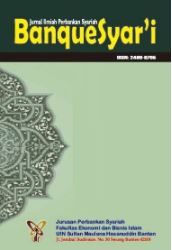The Role of Financial Technology in The Revitalization of Islamic Banking Financial Inclusion in Indonesia
DOI:
https://doi.org/10.32678/bs.v7i2.3752Keywords:
keywords: Financial Technology, Financial Inclusion, Sharia Banking.Abstract
There are still many Islamic bank service products that are not widely accessed by customers and the increasing number of technology-based developing businesses, so Islamic banks must collaborate with financial technology to increase their role to be more inclusive. This paper aims to find out about the role of Financial Technology in increasing financial inclusion in Islamic banks and from the aspects of benefit, opportunity, cost and risk (BOCR) because Fintech in Indonesia is a big opportunity that has not been exploited more massively and systematically in taking these opportunities. The methodology used in this research is normative legal research refreshing law and book literature. Based on the results of the research, the authors conclude that fintech plays a very important role in increasing financial inclusion in Islamic banking with great opportunities that can develop progressively that will make it easier and closer to customers, Islamic banking can access financial service products offered and apply for direct financing. The fast-paced FinTech industry opens up positive opportunities for Islamic banking to undertake strategic partnerships with the FinTech industry as an integral, customer-oriented part.
keywords: Financial Technology, Financial Inclusion, Sharia Banking.
Downloads
References
Peraturan Bank Indonesia No.19 / 12 / PBI / 2017 tentang Penerapan Financial Technology.
Peraturan Otoritas Jasa Keuangan Republik Indonesia Nomor 13 /Pojk.02/2018 Tentang Inovasi Keuangan Digital Di Sektor Jasa Keuangan.
OJK (2020). Statistik Fintech Lending Periode Mei 2020. Otoritas Jasa Keuangan. https://www.ojk.go.id/id/kanal/iknb/data-dan-statistik/fintech/Pages/ -Statistik-Fintech-Lending-Periode-Mei-2020.aspx.
Todorof, M. (2018). Shariah-compliant FinTech in the banking industry. ERA Forum 19, 1–17. doi: 10.1007/s12027-018-0505-8.
Bachtiar Hassan Mirza. 2014. Membangun Keuangan Inklusif. Jurnal Fakultas Ekonomi Universitas Sumatera Utara, Vol. 23, No. 2
Dhar, V., Stein, R. M, FinTech platforms and strategy. Communications of the ACM: 2017, 32-35. Diakses dari https://doi.org/10.1145/3132726 pada tanggal 2 Januari 2021 pukul 01.00 WIB.
Irma Muzdalifa dkk, “Peran Fintech Dalam Meningkatkan Keuangan Inklusif Pada UMKM di Indonesia (Pendekatan Keuangan Syariah)”, Jurnal Masharif alSyariah: Jurnal Ekonomi dan Perbankan Syariah Vol. 3, No. 1, 2018, 5.
www. bi. go. id 2 Januari 2021
Irma Muzdalifa, “Peran Fintech Dalam Meningkatkan Keuangan Inklusif Pada UMKM di Indonesia (Pendekatan Keuangan Syariah)”, 7.
Peran dan Tantangan Industri FinTech (Financial Technology) dalam Perekonomian, diakses pada https://www.ajarekonomi.com/2018/01/peran-dan-tantangan-industri-fintech.html
Kementerian Keuangan (2013), Strategi Nasional Keuangan Inklusif.
Meilisa Salim. Analisis Implementasi Program Financial Inclusion di Wilayah Jakarta Barat Dan Jakarta Selatan (Studi pada Pedagang Golongan Mikro, Instansi Perbankan, Otoritas Jasa Keuangan dan Bank Indonesia) Skripsi: Universitas Bina Nusantara, 2014.
Triana Fitriastuti, Implementasi Keuangan Inklusif Bagi Masyarakat Perbatasan (Studi Kasus Pada Kutai Timur, Kabupaten Kutai Kartanegara Dan Kota Samarinda, Kalimantan Timur, Indonesia), 2015.
Fintech Untuk Meningkatkan Inklusi Keuangan, https://www. kreditpintar.com/blog/fintech-untuk-meningkatkan-inklusi-keuangan-indonesia/ Diakses pada tanggal 2 Januari 2021 pukul 02.00 WIB
Undang-undang Nomor 21 tahun 2008 Tentang Perbankan Syariah,
Muhammad, Manajemen Pembiayaan Bank Syariah (Yogyakarta: Akademi Management Perusahaan YKPN, 2005), h. 1.
David LEE Kuo Chuen, dan Linda LOW, “Inclusive FinTech (Blockchain, Cryptocurrency, and ICO)”, (New York: Worid Scientific, 2018), h.17
Kasmir, Dasar-dasar Perbankan, (jakarta: PT Raja Grafindo Persada) h.168.
Sujadi dan Edi Purwo Saputro, E-Banking: Urgensi Aspek Trust di Era E-Service (Jakarta: Raja Grafindo 2006), h. 6.
Keuangan Inklusif, www. bi. go. id,
R.Andi Kartiko Utomo, Bisnis Model Baru Bank – Tekfin dan Ekonomi Digital, Fintech Talk, opini editorial 22,
Reynold Wijaya, Kolaborasi, Bukan Kompetisi, untuk Inklusi Keuangan Indonesia, Fintech Talk, opini editorial 51,
Abdul Ghofur Anshori, Hukum Perjanjian Islam di Indonesia (Gadjah Mada University Press, 2010), h. 197.
Downloads
Published
How to Cite
Issue
Section
License
Copyright (c) 2022 Muhammad Akbar Taufiqulhakim, Muhammad Reza Atallah

This work is licensed under a Creative Commons Attribution-NonCommercial-ShareAlike 4.0 International License.










